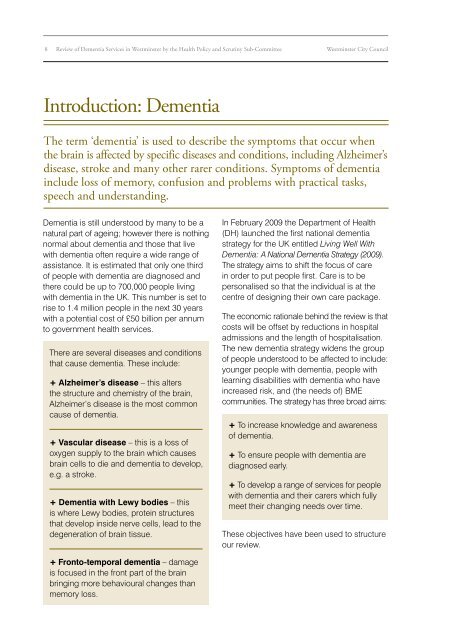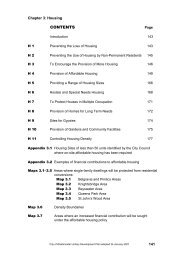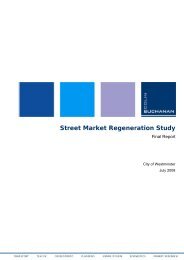Review of Dementia Services in Westminster December 2009
Review of Dementia Services in Westminster December 2009
Review of Dementia Services in Westminster December 2009
You also want an ePaper? Increase the reach of your titles
YUMPU automatically turns print PDFs into web optimized ePapers that Google loves.
8 <strong>Review</strong> <strong>of</strong> <strong>Dementia</strong> <strong>Services</strong> <strong>in</strong> Westm<strong>in</strong>ster by the Health Policy and Scrut<strong>in</strong>y Sub-Committee Westm<strong>in</strong>ster City Council <strong>Review</strong> <strong>of</strong> <strong>Dementia</strong> <strong>Services</strong> <strong>in</strong> Westm<strong>in</strong>ster by the Health Policy and Scrut<strong>in</strong>y Sub-Committee Westm<strong>in</strong>ster City Council 9<br />
Introduction: <strong>Dementia</strong><br />
The term ‘dementia’ is used to describe the symptoms that occur when<br />
the bra<strong>in</strong> is affected by specific diseases and conditions, <strong>in</strong>clud<strong>in</strong>g Alzheimer’s<br />
disease, stroke and many other rarer conditions. Symptoms <strong>of</strong> dementia<br />
<strong>in</strong>clude loss <strong>of</strong> memory, confusion and problems with practical tasks,<br />
speech and understand<strong>in</strong>g.<br />
Westm<strong>in</strong>ster Context:<br />
Incidence and Direction <strong>of</strong> Travel<br />
It is estimated that 529 have been diagnosed with dementia <strong>in</strong><br />
Westm<strong>in</strong>ster. However, Greater London Authority (GLA) population<br />
figures suggest there are 1,648 people <strong>in</strong> Westm<strong>in</strong>ster with dementia<br />
mean<strong>in</strong>g 70% <strong>of</strong> cases rema<strong>in</strong> undiagnosed.<br />
<strong>Dementia</strong> is still understood by many to be a<br />
natural part <strong>of</strong> age<strong>in</strong>g; however there is noth<strong>in</strong>g<br />
normal about dementia and those that live<br />
with dementia <strong>of</strong>ten require a wide range <strong>of</strong><br />
assistance. It is estimated that only one third<br />
<strong>of</strong> people with dementia are diagnosed and<br />
there could be up to 700,000 people liv<strong>in</strong>g<br />
with dementia <strong>in</strong> the UK. This number is set to<br />
rise to 1.4 million people <strong>in</strong> the next 30 years<br />
with a potential cost <strong>of</strong> £50 billion per annum<br />
to government health services.<br />
There are several diseases and conditions<br />
that cause dementia. These <strong>in</strong>clude:<br />
+ Alzheimer’s disease – this alters<br />
the structure and chemistry <strong>of</strong> the bra<strong>in</strong>,<br />
Alzheimer’s disease is the most common<br />
cause <strong>of</strong> dementia.<br />
+ Vascular disease – this is a loss <strong>of</strong><br />
oxygen supply to the bra<strong>in</strong> which causes<br />
bra<strong>in</strong> cells to die and dementia to develop,<br />
e.g. a stroke.<br />
+ <strong>Dementia</strong> with Lewy bodies – this<br />
is where Lewy bodies, prote<strong>in</strong> structures<br />
that develop <strong>in</strong>side nerve cells, lead to the<br />
degeneration <strong>of</strong> bra<strong>in</strong> tissue.<br />
In February <strong>2009</strong> the Department <strong>of</strong> Health<br />
(DH) launched the first national dementia<br />
strategy for the UK entitled Liv<strong>in</strong>g Well With<br />
<strong>Dementia</strong>: A National <strong>Dementia</strong> Strategy (<strong>2009</strong>).<br />
The strategy aims to shift the focus <strong>of</strong> care<br />
<strong>in</strong> order to put people first. Care is to be<br />
personalised so that the <strong>in</strong>dividual is at the<br />
centre <strong>of</strong> design<strong>in</strong>g their own care package.<br />
The economic rationale beh<strong>in</strong>d the review is that<br />
costs will be <strong>of</strong>fset by reductions <strong>in</strong> hospital<br />
admissions and the length <strong>of</strong> hospitalisation.<br />
The new dementia strategy widens the group<br />
<strong>of</strong> people understood to be affected to <strong>in</strong>clude:<br />
younger people with dementia, people with<br />
learn<strong>in</strong>g disabilities with dementia who have<br />
<strong>in</strong>creased risk, and (the needs <strong>of</strong>) BME<br />
communities. The strategy has three broad aims:<br />
+ To <strong>in</strong>crease knowledge and awareness<br />
<strong>of</strong> dementia.<br />
+ To ensure people with dementia are<br />
diagnosed early.<br />
+ To develop a range <strong>of</strong> services for people<br />
with dementia and their carers which fully<br />
meet their chang<strong>in</strong>g needs over time.<br />
These objectives have been used to structure<br />
our review.<br />
Accord<strong>in</strong>g to the GLA, Westm<strong>in</strong>ster will not<br />
see the predicted level <strong>of</strong> nationwide <strong>in</strong>creases<br />
<strong>in</strong> dementia. Instead by 2010, it is estimated<br />
that 1,882 <strong>of</strong> Westm<strong>in</strong>ster residents aged over<br />
65 will have dementia out <strong>of</strong> a population <strong>of</strong><br />
26,700 (7%). By 2025 this number will have<br />
<strong>in</strong>creased to 2,567, and this will still equate<br />
to 7% <strong>of</strong> the population. However, with<strong>in</strong> this<br />
demographic the number <strong>of</strong> very old people,<br />
those over 85, will <strong>in</strong>crease. This means that<br />
the level and <strong>in</strong>tensity <strong>of</strong> care needed will<br />
<strong>in</strong>crease as <strong>in</strong>dividuals are likely to have<br />
multiple and complex needs.<br />
Hard to target groups<br />
With<strong>in</strong> Westm<strong>in</strong>ster’s older population a high<br />
percentage live alone; 57% compared to the<br />
London average <strong>of</strong> 43%. When comb<strong>in</strong>ed<br />
with the second lowest level <strong>of</strong> unpaid care<br />
provision <strong>in</strong> the UK, the result is high levels<br />
<strong>of</strong> social isolation.<br />
A number <strong>of</strong> groups experience dementia<br />
differently than may be anticipated. <strong>Dementia</strong><br />
is less well understood among Black and<br />
M<strong>in</strong>ority Ethic (BME) communities with<strong>in</strong><br />
Westm<strong>in</strong>ster and the symptoms appear<br />
to carry a more restrictive stigma.<br />
The risk <strong>of</strong> develop<strong>in</strong>g the symptoms <strong>of</strong><br />
dementia is four times higher <strong>in</strong> people with<br />
exist<strong>in</strong>g learn<strong>in</strong>g disabilities, and early stages<br />
<strong>of</strong> dementia are more likely to be missed or<br />
mis<strong>in</strong>terpreted. Communication <strong>of</strong> deterioration<br />
<strong>in</strong> symptoms can also be hard to ascerta<strong>in</strong>.<br />
In 2007 it was estimated that 150 people had<br />
young onset dementia with<strong>in</strong> Westm<strong>in</strong>ster<br />
and Kens<strong>in</strong>gton. The needs <strong>of</strong> people with<br />
young onset dementia are different as many<br />
are still <strong>of</strong> work<strong>in</strong>g age and <strong>of</strong>ten have family<br />
and f<strong>in</strong>ancial commitments. They also tend<br />
to be more physically fit than their older<br />
equivalents; and there is a more damag<strong>in</strong>g<br />
stigma attached to the condition.<br />
+ Fronto-temporal dementia – damage<br />
is focused <strong>in</strong> the front part <strong>of</strong> the bra<strong>in</strong><br />
br<strong>in</strong>g<strong>in</strong>g more behavioural changes than<br />
memory loss.

















